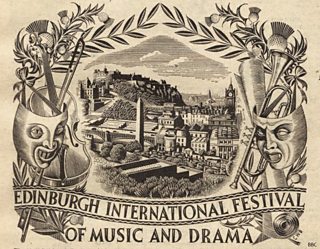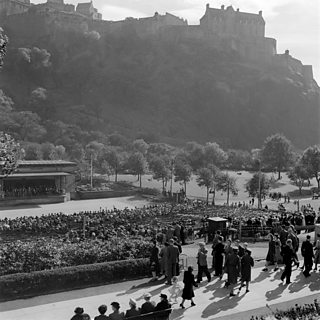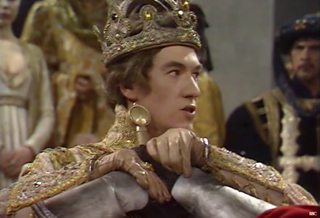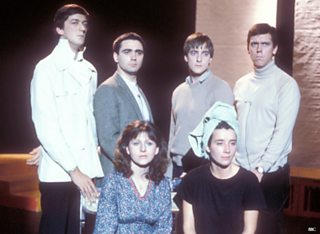
This artwork was used on the cover of Radio Times for the week of the first Edinburgh International Festival of Music and Drama in 1947
Edinburgh, the capital of Scotland, can also lay claim to being the cultural centre of Britain for the three weeks every August that it plays host to the Edinburgh International Festival.
For , this prestigious event has become known worldwide for bringing together some of the best of world culture for three weeks of artistic celebration, and since the beginning the �������� has been there to cover the events and bring many of them to a wider audience.
The Festival was fully titled a festival of music and drama, but it has also coincided with the (now staged earlier in the year), a television festival (since 1976), the , the book festival and of course , which has been in existence more or less formally since the festival began, initially just as a description of events which were not part of the official festival.
The Fringe is not confined to comedy by any means, but it has become best known for that. Yet the most famous comedy show to be presented, which even had the word “Fringe” in its title, was actually part of the official festival - this was of course , which made stars of Alan Bennett, Peter Cook, Jonathan Miller and Dudley Moore.

An outdoor concert in Edinburgh in 1948, in the shadow of the castle - the scenic beauty of the city was one of its main attractions to the original organisers
The Edinburgh International Festival of Music and Drama was created in the wake of World War Two, by , the impresario behind the opera festival, along with others active in the cultural life of Scotland. The idea was to create an arts festival in a city which was capable of absorbing the number of visitors expected, with suitable venues, and pleasant surroundings. Edinburgh fitted the bill, and was also relatively unscathed by bombing in the recent conflict.
From the start the ��������, and particularly the recently inaugurated , whose writ covered broadly the same ground, was interested in covering the events. The festival was previewed on the Third Programme on , on the Scottish �������� Service on 25 May, and on a number of other occasions before the actual festival began on 24 August.
Some of the most outstanding dramas which have been featured at the official Festival include the premiere of T.S. Eliot’s in 1949, and the 1969 Prospect Theatre production of which launched Ian McKellen as an interpreter of Shakespeare. But the festival has always been just as much concerned with music, with �������� broadcasts from the first year including a performance by on the opening night, concerts from the Hallé and Liverpool Philharmonic Orchestras, and a recital by the American baritone Todd Duncan.

Ian McKellen as Richard II in the Prospect Theatre production from the 1969 Edinburgh Festival, later transferred to London and broadcast on �������� television in 1970
As the festival became better known, there began to be references to it in popular culture. In 1953, there was a storyline in radio soap opera about some of the characters going to the Festival. In November 1956, the play was televised, concerning events in a boarding house during the Festival, starring Michael Denison and Stanley Baxter. The 1968 thriller serial (repeated nationwide in 1969) is set at Festival Time too.
In terms of �������� coverage, in 1970 (as Late Night Line-Up was billed at the time) presented editions from Edinburgh, and various other strands have covered the Festival over the years, such as the Late Show spin-off . �������� Scotland has always done its own coverage for local consumption alongside the network output. There is also a tradition of various Radio 2 presenters’ shows coming from the Festival, for example , Brian Matthew and David Hamilton.
The first mention of the Fringe in Radio Times is on 8 September 1955, when excerpts from the revue were presented on �������� Television. Thereafter there is usually at least one �������� programme each year that features Fringe productions. The series on 25 August 1958 proposed that "visiting and local amateur companies have supplied many of the most stimulating of the dramatic offerings."

Bright Young Things: the 1981 Cambridge Footlights cast have never been short of mineral water since
As time has gone on the Fringe has become almost synonymous in the popular imagination with comedy, both following Beyond the Fringe when there was an upsurge in interest in university revues, and with the rise of so-called ‘alternative comedy’ from the end of the 1970s, which has now become firmly the mainstream.
The comedy element of the Fringe inspired the , now succeeded by the Eddies, given to the best comedy show, the most promising newcomer, and the more recent Panel Prize. The first winner of the Perrier was 1981’s Cambridge Footlights team, who included Stephen Fry, Hugh Laurie and Emma Thompson. Previous Footlights and Fringe graduates include members of Monty Python's Flying Circus, and ; the tradition has continued in recent years with the likes of , and David Mitchell.
Edinburgh has become the place to go to launch new acts and for established comics to try out new material. The ranks of today’s top comedians and presenters are full of past winners and runners-up. If you want to see the stars of the future gathered in one place, go to Edinburgh.
